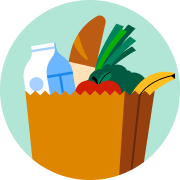
Fast delivery
Get in as fast as 1 hour

It’s all local
Shop your favorites

Direct chat
Connect with shoppers
Health Care
Health Care Delivery or Pickup

About health care
Having the right health care products on hand can help you effectively deal with a wide range of conditions. It's often best to keep a well-stocked medicine cabinet that has the basic items for minor injuries and illnesses so you won't have to run errands when you or someone in your family isn't feeling well. If you find that you don't have what you need on hand, you can order many essential health care products online through Instacart.
Order through Instacart to make your day a little easier when you're under the weather or overwhelmed with other items on your to-do list.
Stocking your medicine cabinet
If you want to make sure you're prepared for the unexpected, here are some smart items to keep in your medicine cabinet at all times:
- Anti-bacterial ointment.
- Bandages.
- Pain reliever.
- Calamine lotion.
- Decongestant.
- Allergy medication.
- Antacids.
- Antidiarrheals.
- Activated charcoal.
- Thermometer.
- Rubbing alcohol.
- Tweezers.
If you have children, you may need child-appropriate versions of many of these items, such as a children's pain reliever or children's cold medicine.
Choosing vitamins and supplements
Regularly taking vitamins and supplements can help you support your day-to-day health. For most people, a daily multivitamin is a good idea. You can find multivitamins that are formulated for your specific needs, such as prenatal vitamins, women's multivitamins, men's multivitamins, and children's multivitamins. Some of the most important ingredients in your multivitamin are:
- Calcium: For strong bones and teeth.
- Vitamin D: To help your body absorb calcium.
- Magnesium: To support energy levels and bone health.
- Iron: To support healthy red blood cells.
- Zinc: To strengthen your immune system.
- Vitamin B-12: To help you break down micronutrients.
Generic vs. name-brand medications
As you're shopping for health care products, you may notice generic medications with names such as "pain reliever" alongside well-known products such as Tylenol. Generic medicines provide the same benefits as their name-brand counterparts. By comparing the ingredient labels, you can determine which generic options have the same formulation as the brand name that you're familiar with.
The FDA continually monitors drug products to make sure they're effective and safe. Drug companies must prove that each generic medicine has the same active ingredient, strength, and manufacturing standards as the brand-name version it's copying. Thus, the primary difference between generic and name-brand medications is the price, with generics coming in much cheaper.
Health Care Near Me
Buy your favorite Health Care online with Instacart. Order Muscle and Joint Care, Personal Protective Equipment, Children's Health, and more from local and national retailers near you and enjoy on-demand, contactless delivery or pickup within 2 hours.
Browse more Health Care categories:
FAQs about health care
You can purchase over-the-counter medications, supplements, and first aid supplies through Instacart. Over-the-counter (OTC) medications are those that are available for purchase without a prescription. Some examples of health care products you can purchase through Instacart are bandages, cough drops, pain medication, heating or cooling patches, antacids, allergy relief medication, cotton balls, vitamins, and ice packs.
Dietary supplements include a wide range of products, such as vitamins, minerals, botanicals, and herbs. If you don't eat certain foods, dietary supplements may help you get the nutrients you need to support your health. For example, if you don't eat fish, you may want to take fish oil supplements for the omega-3 acids.
Speaking to your health care provider is the best way to identify the optimum supplements for your personal needs. You might also speak with a pharmacist to discuss your needs. It's important to disclose all medications you're taking so your health care provider can make sure you don't select supplements that will interfere with your other drugs. For example, St. John's wort can make birth control pills less effective.
The U.S. Food and Drug Administration (FDA) doesn't regulate supplements the same way that it regulates drugs. The FDA does not test or approve supplements before they hit the market and can only take action against a supplement manufacturer or distributor after a product on the market is found to be unsafe. For this reason, it's important to speak with a health care provider before you begin taking a new supplement.
Dietary supplements may help address a nutrient deficiency, reduce your risk of developing a health problem, and support your overall health and wellness. However, supplements are not intended to prevent, cure, mitigate, or treat diseases. You can get more information on various supplements from the National Institutes of Health, the FDA, and the Federal Trade Commission. Do not attempt to self-diagnose any health problem. Seek professional medical advice instead.
When giving medication to a child, you should only use products that are formulated for that child's age range. For example, the FDA does not recommend medication for cold or cough symptoms for children under 2 years old. Aspirin should not be given to anyone under the age of 19 without first consulting a doctor. Check the label to determine which products are appropriate for children. Never give adult medication to a child.
When determining the appropriate dosage, it's best to go by your child's weight. Appropriate dosage information is available on the packaging of OTC medications. If you have any questions or concerns, call your pediatrician for further clarification.
Though OTC medications are easy to obtain, this doesn't mean they're not dangerous. OTC medications can present serious health risks if taken inappropriately. If you're taking other medications, you should always check for drug interactions before you take something new. Your pharmacist or health care provider can let you know if there are any drug interactions that you should be aware of. Alcohol can interact with many OTC medications, such as antihistamines, cough and cold medicine, or medications for sleeplessness.
Always follow the manufacturer's recommendations for the appropriate dosage with any type of medication. Do not take more than the recommended dose without consulting your health care provider. Store your medicine in a cool, dry place, and dispose of any medication that's past its expiration date.
Keep up your supply of essential health care items to ensure you can quickly address the situations that call for them. Instacart can help with all your over-the-counter health care needs.



















































